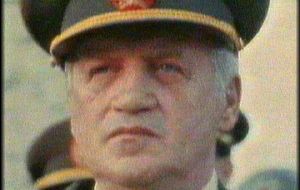MercoPress. South Atlantic News Agency
The night the Falklands' conflict became an inevitable war
 “I'm one in three” replied General Galtieri
“I'm one in three” replied General Galtieri Former US Ambassador in Argentina Harry Shlaudeman and declassified US national security documents of 25 years ago reveal desperate last minute efforts the night of April 30 to avoid the Falkland Islands conflict from becoming a full fledged war.
According to a report from La Nacion, that midnight US Ambassador Shlaudeman met with General Leopoldo Galtieri at the Argentine Army headquarters and, without specific instructions from the White House, requested in a last good will gesture, troops be withdrawn from the Falklands to which apparently Galtieri was receptive but conditioned to the decision of all Junta members, "I'm one in three". "We've received no reply to our only proposal. If this goes on, tomorrow we'll be announcing measures against Argentina", Shlaudeman told Galtieri in a friendly tone. Former Secretary of State Alexander Haig had failed in his London/Buenos Aires shuttle diplomacy, President Ronald Reagan had on his desk the following day's announcement of US support to Britain, the US Senate was pressing and the Pentagon's Caspar Winberger was already supplying logistics support to the British. The meeting was "not tense; we were all very tired and disheartened, we all knew it was the last chance", recalls Shlaudeman interviewed by La Nacion in California. After the two hour meeting with Galtieri the diplomat returned to the Embassy, wrote a report and tried to get some sleep. The following day Shlaudeman met Galtieri at Government House, Casa Rosada, and the reply we negative: no troops' withdrawal, "the Navy is anxious to get into combat". "Argentina can't act unilaterally as if conceding to pressure". From the declassified documents of the US National Security Archives, Shlaudeman seems to describe Galtieri as a man intent in reaching a peaceful agreement and aware that he's "a prisoner of history" and the events unfolding. La Nacion's reporter insists in the interview with Shlaudeman about Galtieri's drinking habit or reputation on that particular night, but the US ambassador insists every body was very sober and if any drinking took place "it was anecdotic". Actually, "when we met (in normal times) we never had more that a couple of Scotch". But more interesting is the admission by US officials that they really didn't know who was really in command in the Argentine dictatorship. "It's not clear", admits US Secretary of State Haig to then British Foreign Secretary Francis Pym is a classified message. "Maybe up to 50 people, including commanders in the field, could be exercising vetoes. Actually there's not much I can do about it. This is over for me", admits Haig. Marcos Novaro a Buenos Aires University political scientist and military governments' researcher is more specific: "they were really deadlocked. A vertical institution becomes a collegiate, a balkanized organization. It was common with other Latinamerican armies ruling as dictatorships. They become an Army (political) party, in permanent assembly". And that was evident in the morning or April 30, 1982 when Galtieri informs Shlaudeman about the Navy's veto and the "beginning of the end". A few hours later following the Argentine Junta refusal to a "good will troops withdrawal", President Reagan announces full support for Britain; May first Vulcan aircraft bomb Stanley airfield and May second the old cruiser General Belgrano is sunk with two torpedoes.




Top Comments
Disclaimer & comment rulesCommenting for this story is now closed.
If you have a Facebook account, become a fan and comment on our Facebook Page!